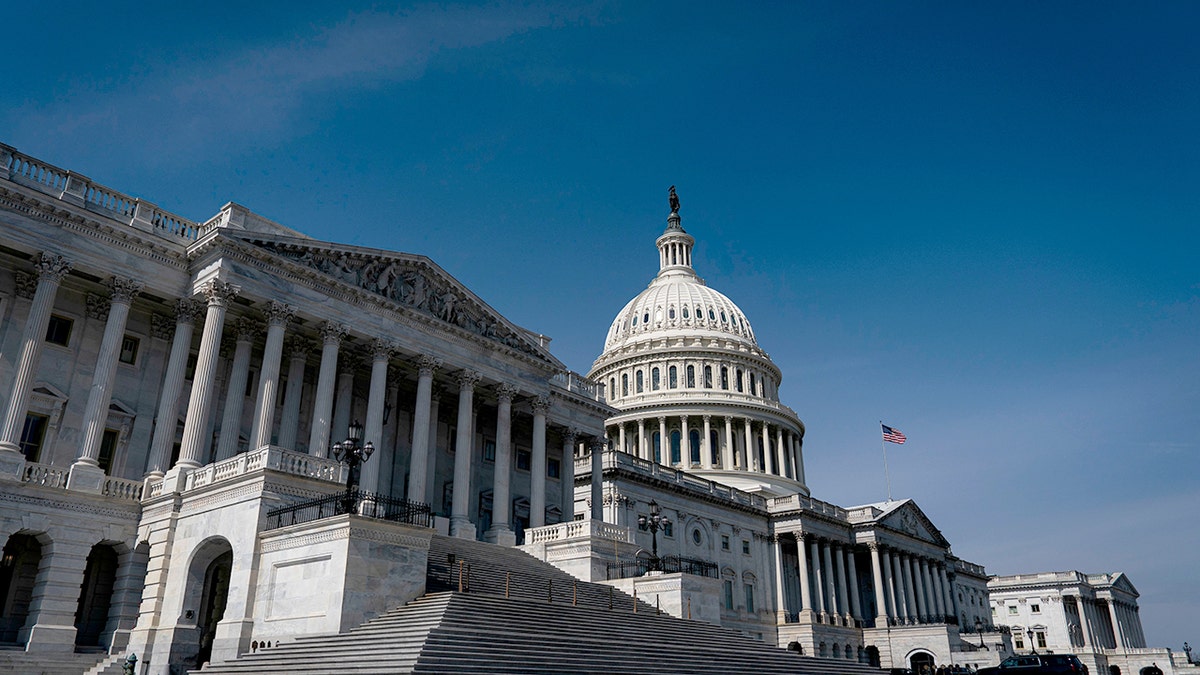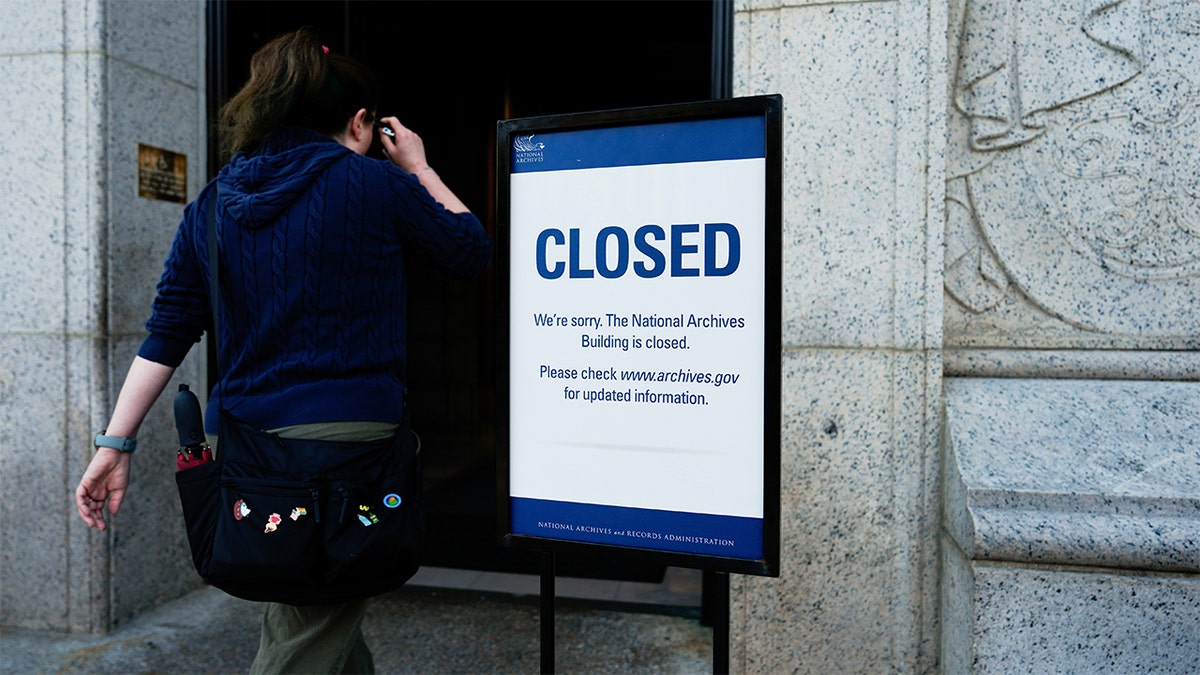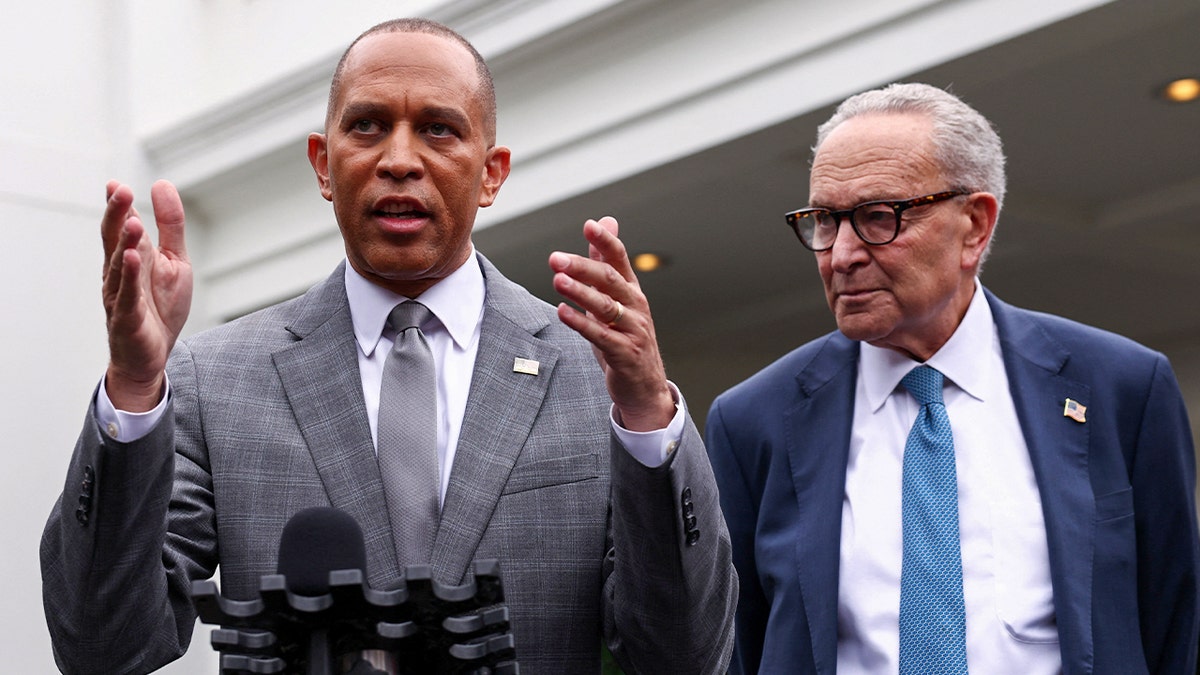

With a government shutdown in effect, both sides of the aisle are looking to place blame on the other. House Speaker Mike Johnson pointed out that while Democrats expressed outrage over the proposed legislation, it is similar to several continuing resolutions that passed under the Biden administration.
"The nonpartisan clean CR only appears ‘partisan’ because 212 House Democrats and 46 Senate Democrats chose to make it that way. This CR is the same short-term funding extension that virtually all Democrats voted to pass 13 times during the Biden Administration. Despite this voting history, nearly every Democrat has refused to support the current clean, nonpartisan funding extension to keep the government open and operational," Johnson said in a statement.
During the Biden administration, there were 13 instances in which Congress enacted short-term funding measures, also known as continuing resolutions.
SPEAKER JOHNSON REVEALS THE HIDDEN GOP ADVANTAGE TO GOVERNMENT SHUTDOWN

Speaker of the House Mike Johnson (R-LA) speaks as U.S. Senate Majority Leader John Thune (R-S.D.) looks on during a press conference on the first day of a partial government shutdown, at the U.S. Capitol, in Washington, D.C., Oct. 1, 2025. (Jonathan Ernst/Reuters)
On Sept. 30, 2021, Congress passed H.R. 5305, also known as the Extending Government Funding and Delivering Emergency Assistance Act. This legislation gave the government nine weeks of funding and averted a shutdown.
The act not only extended funding levels, but also added allocations for natural disaster relief and the influx of evacuees from Afghanistan following the Biden administration’s botched withdrawal.
Additionally, it extended programs and authorities such as the National Flood Insurance Program, the Temporary Assistance for Needy Families (TANF) program, the National Advisory Committee on Institutional Quality and Integrity and the United States Advisory Commission on Public Diplomacy, among others.
Following the previous short-term funding measure, on Dec. 2, 2021, Congress enacted H.R. 6119, the Further Extending Government Funding Act, providing FY2022 appropriations through Feb. 18, 2022.
Like the act before it, this legislation also provided appropriations for several federal agencies for activities related to Afghanistan evacuees. This included what was then called the Department of Defense (now, the Department of War), the Department of Homeland Security, the Department of Health and Human Services, and the Department of State.
The resolution also extended several authorities, including the authority for HHS to make appointments for the National Disaster Medical System. There was also an extension of the pay freeze for certain senior officials and political appointees in the executive branch.
The Further Additional Extending Government Funding Act, H.R. 6617, went into effect on Feb. 18, 2022, as its predecessor expired. The legislation continued to fund most programs at FY2021 levels with some exceptions that provided what Congress referred to as "funding flexibility."
The continuing resolution also included provisions on then-President Joe Biden’s authority "draw down defense articles and services to respond to unforeseen emergencies" and the Department of the Interior’s implementation of cybersecurity safeguards.
H.R. 6617 gave the government just under a month — until March 11, 2022 — to avoid a shutdown.
Unlike previous continuing resolutions that gave the government weeks to avert a shutdown, the Extension of Continuing Appropriations Act, 2022, also known as H.J.Res. 75, was set to expire days after it was enacted.
Just before this legislation was set to expire on March 15, 2022, Biden signed the Consolidated Appropriations Act, 2022, which served as the omnibus appropriations package for FY2022.

The U.S. Capitol building in Washington, D.C. (Al Drago/Bloomberg via Getty Images)
GOP LAWMAKER WANTS CONGRESS TO FEEL THE PAIN DURING SHUTDOWNS WITH BOLD PROPOSAL
Congress enacted H.R. 6833, the Continuing Appropriations Act, 2023, which provided FY2023 appropriations to federal agencies through Dec. 16, 2022. It also provided supplemental appropriations that allowed the U.S. to help Ukraine and established a compensation program for victims of the Hermit's Peak/Calf Canyon fire in New Mexico.
The legislation also extended several immigration-related programs and provided additional funding for the Administration for Children and Families to carry out the Unaccompanied Children Program, a federal program aimed at helping unaccompanied minors encountered at the border.
The Further Continuing Appropriations and Extensions Act, 2023, H.R. 1437, provided several extensions, though most of them were set to expire on Dec. 23, 2022.
One of the extensions that the act provided was for the FCC to continue auctions for electromagnetic spectrum licenses. The legislation also provided for the payment to the family of the late Rep. Donald McEachin, D-Va., who died in office.
Additionally, the act required the National Oceanic and Atmospheric Administration (NOAA) to update precipitation estimates.
The Further Additional Continuing Appropriations and Extensions Act, 2023, H.R. 4373, extended FY2023 appropriations to several federal agencies through Dec. 30, 2022. Additionally, it extended expiring programs and authorities.
H.R. 4373 was the final stopgap legislation of FY2023. On Dec. 29, 2022, an omnibus bill known as the Consolidated Appropriations Act, 2023, was signed into law. The $1.7 trillion spending bill funded the government through Sept. 30, 2023.

A closed sign stands in front of the National Archives on the first day of a government shutdown, Wednesday, Oct. 1, 2025, in Washington. (Julia Demaree Nikhinson - AP Photo)
GOVERNMENT SHUTDOWN CONTINUES AS SENATE DEMS BLOCK GOP FUNDING BILL FOR 3RD TIME
H.R. 5860, also known as the Continuing Appropriations Act, 2024 and Other Extensions Act, provided extensions of FY2024 appropriations for federal agencies through Nov. 17, 2023 and provided emergency funding for disaster relief.
The legislation also gave extensions for Federal Aviation Administration programs, such as the Airport Improvement Program and the Unmanned Aircraft Systems (UAS) Test Site Program. Additionally, the bill reauthorized the FDA to collect fees for generic animal drug applications through FY2028.
The Further Continuing Appropriations and Other Extensions Act, 2024, H.R. 6363, provided continuing FY2024 appropriations for federal agencies.
The legislation was laddered, meaning it contained various expiration dates for different provisions. Some of the funding was set to be provided through Jan. 19, 2024, while other parts expired on Feb. 2, 2024.
Additionally, it provided for a payment to the family of the late Sen. Dianne Feinstein, D-Calif., who died in office.
The Further Additional Continuing Appropriations and Other Extensions Act, 2024, P.L. 118-35, was signed on Jan 19. 2024, averting a government shutdown. It was also laddered, giving some programs an expiration date of March 1, 2024, and others March 8, 2024.
The legislation itself gave Congress more time to negotiate by making technical adjustments rather than sweeping policy changes.
H.R. 7463, also known as the Extension of Continuing Appropriations and Other Matters Act, 2024, modified requirements for determining eligibility for federal student aid, provided continuing FY2024 appropriations for federal agencies as well as additional funding for Federal Pell Grants.
This acted as a continuation of the Further Additional Continuing Appropriations and Other Extensions Act, 2024, and moved the March 1, 2024, expiration date to March 8. Additionally, the March 8 expiration date was extended to March 22, 2024.
Biden then signed the Consolidated Appropriations Act, 2024, on March 9, 2024, which provided the government with funding through Sept. 30, 2024. It included several appropriations bills, such as the Military Construction, Veterans Affairs, and Related Agencies Appropriations Act, 2024; the Agriculture, Rural Development, Food and Drug Administration, and Related Agencies Appropriations Act, 2024; and
the Commerce, Justice, Science, and Related Agencies Appropriations Act, 2024, among others.

U.S. House Minority Leader Hakeem Jeffries (D-NY) speaks to the media next to U.S. Senate Minority Leader Chuck Schumer (D-NY), on the day U.S. President Donald Trump meets with top congressional leaders from both parties, just ahead of a September 30 deadline to fund the government and avoid a shutdown, at the White House in Washington, D.C., Sept. 29, 2025. (Kevin Lamarque/Reuters)
Continuing Appropriations and Extensions Act, 2025, also known as H.R. 9747, which provided continuing FY2025 appropriations to federal agencies through Dec. 20, 2024.
The legislation provided additional funding for the U.S. Secret Service and extended several expiring programs and authorities. Some of the miscellaneous extensions were given to the DHS Joint Task Forces, the Chesapeake and Ohio Canal National Historical Park Commission and others.
H.R. 10545, the American Relief Act, 2025, provided continuing FY2025 appropriations to federal agencies through March 14, 2025. It also provided supplemental appropriations for disaster relief and assistance related to hurricanes, wildfires, severe storms, flooding, tornadoes and other natural disasters.
The legislation also included public health funding extensions through March 31, 2025.
